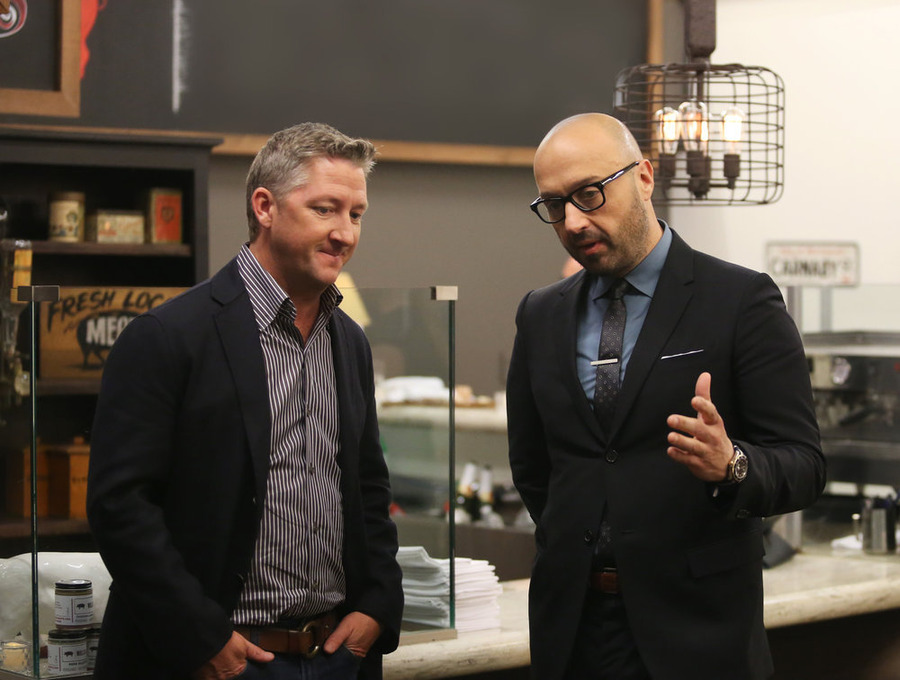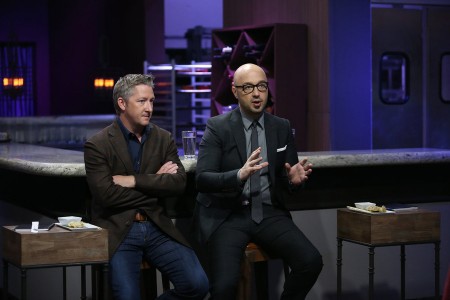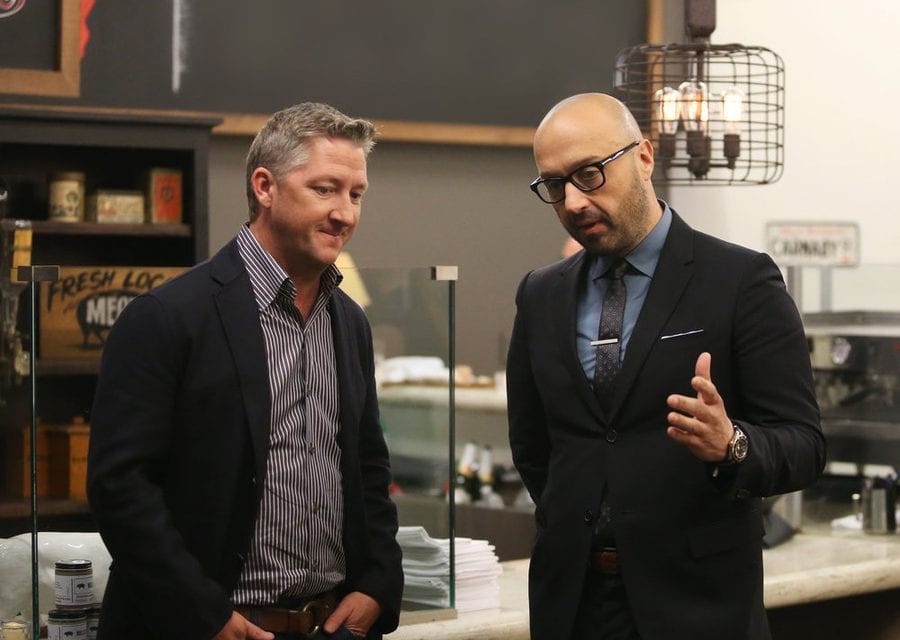
Tim Love and Joe Bastianich
Restaurant Startup, a new reality series airing its second episode tonight on CNBC, is kind of a culinary version of Shark Tank, where two famed restaurateurs decide whether to invest their own money in a particular concept. But rather than featuring Dallas’ Mark Cuban, this show stars Fort Worth chef Tim Love, alongside Joe Bastianich. Each episode begins with two teams pitch their ideas and possibly launching a pop-up version of their concept.
Tim and Joe sat down for a joint interview, and here’s some of what they had to say.
Question: You guys can be pretty rough sometimes. What was it about the premise of the show that appealed to you, made you want to be involved? Did CNBC basically come to you and pitch the show to you similar to the way the wanna-be restaurants did and if so did you make the people at CNBC cry or stammer during the negotiations?
Joe Bastianich: I think it’s an opportunity to take an inside look at a very unique business that not many people understand it and combine a lot of things that people are very passionate about: great hospitality, food, money in the restaurant business, what it takes to be successful in the hospitality industry [and] show the inner workings.
Tim Love: The show itself is really a completely different look at a food show, which is really what interested me. I have a big passion for the business side of the food and wine world and I spoke with Joe about doing the show and he has the same kind of outlook. There’s a lot of shows out there that talk about the drama of whether or not you can make a blah-blah. But really, this show is about whether or not you can build an actual restaurant and the inner workings of how that even happens.
So we feel like this show is going to really expose a new material to people and understanding of really the start to finish of how you might operate a restaurant and how that comes to fruition because, quite frankly, these days it’s almost impossible to have a restaurant without getting an investor, and this gives us an opportunity to show people that not only works but also gives Joe and I an opportunity to maybe invest in something we feel like can be really great.
The investors or the restaurants on the show are dealing with a limited amount of time. How much does the show reflect what it was like for you when this was coming out, when you all were coming out in the restaurant business? What was it like gathering investors for you and do you sort of wish a show like this had been around when you started?
 Love: I wish a show like this was around [back then]. When I got started, nobody would invest in me so I had to use all my own money and build my own restaurant, which is kind of like what the show is. We put a time limit on there because you got to realize we are producing a TV show so we got to give them some sort of challenges.
Love: I wish a show like this was around [back then]. When I got started, nobody would invest in me so I had to use all my own money and build my own restaurant, which is kind of like what the show is. We put a time limit on there because you got to realize we are producing a TV show so we got to give them some sort of challenges.
And it also shows what they’re capable of doing, how they handle pressure, can they make things happen. That’s a big deal for me when I’m looking at whether or not I want to put some money into their concept. I need to be sure these guys are capable of handling things under pressure.
The show allows us to really push them to their limits and then it helps us make the decision of whether or not it’s a viable investment for us. We’re interested in investing in things that make money. When I got started with Lonesome Dove [Emily] I had about $65,000 to $70,000 of our money that we saved and we had to build every wall in there. So it’s kind of the same thing, really.
There’s a lot of pressure on these young guys or young girls trying to figure out how to do something and at the same time trying to impress Joe or impress me to give them a bunch of money. So it gets pretty hairy at times.
Bastianich: I think that people lose sight in the last 25 years, restaurants have become very sensationalized by media and the advent of cooking on television, first cooking shows, and then food reality shows. When I started in 1992 in Manhattan Theater District, failure was not an option. My first investor was my grandmother who’s still my single and only and best investor who gave me $80,000 to open my first restaurant. It was a nuts and bolts business. It was doing everything from getting up in the morning to shopping to creating the menu to hiring the cooks to feeding the people.[Now] I think [the restaurant business] has been glamorized a little bit as people go out and use restaurants to entertain themselves and restaurants become theater. But at the end of the day a restaurant is very much a hard-driving business where a restaurateur has to be able to do a little bit of everything. You have to be jack of all trades and I think the show brings that to life.
I think it’s certainly different than any other food show on TV, even ones that I do [MasterChef], because it is very much a business show and about us investing real dollars. I think we’ve invested over seven figures in the first season alone and I think that people will come to the show because they will really learn something. What does your food cost needs to be what’s your gross margin, what is the labor cost, how do you make sufficient margin in the restaurant? Where does the profit come from? If people enjoy it they’ll enjoy it because they’re going to learn something as well as be entertained. And I think that’s a really big point in this, that people will come away with a business education about the food and wine industry.
When you have two teams standing in front of you, what do you look for — things like experience or intangibles like a passion for cooking, passion for business? Is there any criteria that you both set down before you go into a decision-making process?
Bastianich: I think for me it’s a lot of instinct. When you look at someone, you’re just seeing someone you want to invest in or someone we won’t even bring in to our restaurant, to see what they have. It’s a lot about how smart are they, how can they articulate their idea, what experience they have. But the decision is made at least from my part and from Tim’s part after years and years of experience of making this kind of decisions, whether it’s deciding people in the ventures or hiring people is something that comes from the gut.
Love: Yes, I mean you think that, you know, you will watch the show and go, there’s no way they’re going to make a decision like that that quickly, but you think about the business decisions that are made all the time. You sit down in a meeting with somebody, you sit around the table, you have some coffee, maybe you have a cocktail and you shoot the shit for about an hour, you know exactly what that person’s made of and how they do things and how they operate.
The same thing happens for us. When we interview these guys individually and then we put together for when Joe and I make the decision on who we’re going to put forward and you can kind of see how they react just by when Joe and I are having discussions in front of them. And that’s why we do that on purpose to see really if they react to it, if they butt in and kind of stand up for themselves and how they react to that. It’s a big opportunity for us to see what their personality is and are they bold enough to really go forward on their own or do they need a lot of direction, a lot of mentorship and that, you know, 45 minutes that we spend in front of the two of them side by side tells a lot about the person.
At the same time, quite frankly, I’m a food-first kind of person. They got to feed us and the food has got to be good. If the food’s not good, it’s not even worth talking to you. So it happens all very quickly but at the same time you learn so much so fast.
Any ideas you think were just too out-there to fly?
Bastianich: Someone may be passionate about (fluffernutter) sandwiches but a chain of (fluffernutter) sandwiches throughout the country does not make any sense. So you see a lot of people who are across the rails in terms of what’s viable with their passion. And then you see some people who because of maybe just a very pure perspective come up with some ideas that are very, very, you know, spot-on so, yes, you see both extremes.
Love: In this first season there were a couple of concepts that I thought for sure were just going to suck and it turns out I really bought into the deal and I really loved it. You want to make sure you don’t form an opinion before you see what it is. There were a couple of concepts definitely this season that really, really shocked me in a really good way. Without giving too much away, there is a lot of stuff like that and we feel like, as the show moves on, we’re going to see a lot more really good talent that comes out.
What is your your favorite kind of food and type of restaurant? Tim’s restaurant has amazing ribs and corn.
Bastianich: My favorite kind of restaurant is the kind of restaurant that makes money.
Love: I knew that was Joe. That’s my kind, too. A favorite restaurant is kind of a weird great question because really it really depends on mood, and that’s why there are so many people that could be successful in the business.
Bastianich: It’s really important for us as investors and restaurateurs to be in touch with trends and food and eating. And you know what a bunch of 23-year-old line cooks are dreaming about in Seattle is probably very different than what Tim sees in Fort Worth and what I see in New York or L.A.
What do you think is the biggest problem young entrepreneurs face when trying to open a restaurant?
Love: The biggest problem is experience, clearly, which is really what we Joe and I offer to these young people who are coming in and want to open up a restaurant. Ideas as they always are a dime a dozen. Really good ideas can even be more than that but just because there’s an idea floating out there doesn’t mean anything. It has got to come to fruition. It has got to come in a very focused way. A young entrepreneur generally is very scatterbrained and unorganized yet very passionate and we’re looking for some guys or girls that can come in there and have this really passionate and very enthusiastic idea yet can focus it and show that they can pinpoint where this energy needs to go and to make that restaurant open.
It’s really compelling and I hope that it comes across that way, you know, in the edits and stuff because, you know, when you’re investing $150,000, $300,000, $500,000 in something it’s no joke and not only we’re making somebody’s dream come true but I could also crush my own dream like handing off the wrong money. It’s putting the reality kind of back in reality TV. Everything that we do on that show is real on our end.
Can you preview anything else from this season without any spoilers?
Love: I guess one thing I’d want to say about the show the most is this show is not a food competition, which is 7 million of them out there and this show is not a “let’s create drama and people cry” kind of show. It’s a show where people tune in because they’re like, hey, I’ve been cooking for the last 12 years, I want my chance. Restaurant Startup is the chance. It has never existed before and Joe and I are providing that opportunity for people’s dreams to come true and this is it. And a lot of them come true and a lot of them that you think is going to happen and it just crumbles at the end. And it only crumbles because the people just can’t perform.
What do you think of the cupcake trend? Is it over?
Bastianich: I’ll give you a big picture. I think that cupcakes, if you’re going to take $100,000, you’d probably be better to burn it on the street because at least you’d have a fire, yes. You stay warm for a night, that’s for sure.
















